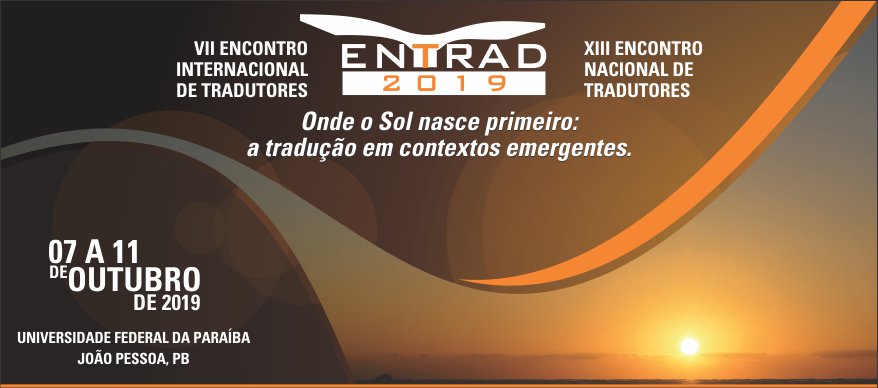Antes de se inscrever, leia as orientações AQUI
Reflexões e práticas de tradução na era pós-colonial
Reflections and practices in the post-colonial era
Leila Cristina de Melo Darin
PUC-SP
ldarin@uol.com.br
http://lattes.cnpq.br/2682139953614636
Lynn Mario Trindade Menezes de Souza
USP
lynnmario@gmail.com
http://lattes.cnpq.br/4083561283385617
Liliam Ramos da Silva
UFRGS
liliam.ramos@ufrgs.br
http://lattes.cnpq.br/4223643208534570
Idiomas de trabalho | Work languages: Português
Resumo: A relação entre os Estudos Pós-coloniais e os Estudos da Tradução entretece-se a partir da percepção de que obras literárias produzidas em contextos coloniais deixavam transparecer imagens dos sujeitos colonizados moldadas pelo conjunto de valores do colonizador. Posteriormente, o exame crítico dessa prática de dominação cultural será empreendido por estudiosos da cultura e da literatura – em grande parte por aqueles que foram eles mesmos produzidos no bojo de sociedades colonizadas. Eles destacarão o fato de que a representação é sempre situada social e historicamente e por isso atravessada pela diversidade que constitui cada sujeito baseada em seu pertencimento simultâneo a diversos grupos sociais. A partir disso, surge o conceito do hibridismo implícito em todos os sujeitos e em todas as culturas. Nesse contexto, o uso da metáfora “tradução cultural”, oriunda da área de Estudos Culturais, tem se mostrado apropriado para a reflexão sobre os processos de globalização, que sucederam ao período colonial, e os movimentos migratórios, uma vez que implicam trocas constantes e o esforço da ressignificação tradutória e da recriação de sentidos forjados na vivência das diferenças irredutíveis entre culturas e línguas. Neste Simpósio, nos valemos do conceito de “tradução cultural”, tal como empregado pelo teórico indiano Homi Bhabha (1994), para evocar a travessia de todos os tipos de fronteiras, com ênfase no processo pelo qual passam indivíduos e grupos ao ingressarem em novos contextos geográficos, linguísticos, sócio-políticos e culturais. Bhabha enfatiza o poder do tradutor cultural o qual se situa no espaço entre culturas, lugar de tensão e contínua negociação, marcado por conflitos – e não pela resolução das diferenças. Também nos interessa o conceito de “tradução intercultural”, que Boaventura de Sousa Santos (2014) emprega partindo da perspectiva de sua teorização sobre as epistemologias do Sul, a ecologia dos saberes e as ‘zonas de contato traduzíveis’, incluindo a linguagem e a noção de ‘traduzibilidade’ no sentido benjaminiano das “leis que governam a tradução” e podem incitar a ver diferenças e assimetrias: “Como essas assimetrias que se instalam no trabalho de tradução podem ser reduzidas ou eliminadas?” (2014 apud CAPELLER, 2015, p. 314). Esse último questionamento em muito representa as preocupações que nos instigam: Como articular e negociar diferenças entre dois conjuntos culturais, dois idiomas, dois sistemas literários? Que estratégias têm sido utilizadas na tradução de textos ficcionais que retratam formas linguísticas fronteiriças ou “marginais”? Em que medida a tradução entre culturas pode, de fato, promover uma ética da diferença? Que projeto o sujeito tradutor pode assumir, vis-à-vis as instâncias reguladoras que financiam, endossam e divulgam as traduções? Aceitamos trabalhos que procurem investigar temas relacionados a essas inquietações.
Palavras-chave: Tradução cultural, Pós-colonialismo, Tradução intercultural
Abstract: The relationship between Postcolonial and Decolonial Studies and Translation Studies emerged from the perception that literary works produced in colonial contexts disclose images of colonized subjects shaped by the values of the colonizer. The critical examination of this practice of cultural domination has been undertaken by scholars of culture and literature – largely by those who were themselves products of colonized societies. They have highlighted the fact that representation is always socially and historically situated and therefore made up by the diversity that constitutes each subject based on its simultaneous belonging to various social groups. From this derives the concept of hybridity, constituent of all subjects and all cultures. In this context, the use of the metaphor “cultural translation”, coming from the area of Cultural Studies, has proved appropriate for reflections on the processes of globalization that followed the colonial period, and on the migratory movements, since they both imply constant exchanges and the effort of translational resignification and of the re-creation of meanings forged in the experience of irreducible differences between cultures and languages. In this Symposium, we use the concept of “cultural translation” as conceived by the Indian theorist Homi Bhabha (1994), to evoke the crossing of all types of frontiers, with emphasis on the process that individuals and groups go through when they join in new geographical, linguistic, socio-political and cultural contexts. Bhabha emphasizes the power of the cultural translator who dwells in the interstices between cultures, spaces of tension and continuous negotiation marked by conflicts – and not by the resolution of differences. We are also interested in the concept of “intercultural translation”, which Sousa Santos (2014) employs from the perspective of his theorizing about the Epistemologies of the South, the ecology of knowledge and the ‘translatable contact zones’, including language and the notion of ‘translatability’ in the Benjaminian sense of ‘laws governing translation’ which may incite us to see differences and asymmetries: “How can these asymmetries that are installed in the work of translation be reduced or eliminated?” (2014, p.314). This last questioning represents the main concerns that instigate us: How to articulate and negotiate differences between two cultural groups, two languages, two literary systems? What strategies have been used in the translation of fictional texts that depict borderline or “marginal” linguistic forms? To what extent can cross-cultural translation actually promote an ethic of difference? What project can the translating subject assume, vis-à-vis the regulatory bodies that finance, endorse and disseminate translations? We will accept papers that seek to investigate themes related to these concerns.
Keywords: Cultural translation, Post colonialism, Intercultural translation
Antes de se inscrever, leia as orientações AQUI
